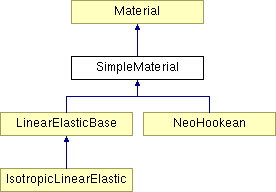SimpleMaterial Class Reference
Material whose thermodynamic state depends only on the local strain. More...
#include <Material.h>

Public Types | |
| enum | ConstRespMode { COMPUTE_TANGENTS, SKIP_TANGENTS } |
for use with getConstitutiveResponse optional to compute the tangents or skip the computation More... | |
Public Member Functions | |
| SimpleMaterial (double rhoInput=0) | |
| virtual | ~SimpleMaterial () |
| SimpleMaterial (const SimpleMaterial &SM) | |
| Copy constructor. | |
| virtual SimpleMaterial * | clone () const =0 |
| virtual bool | getConstitutiveResponse (const std::vector< double > &strain, std::vector< double > &stress, std::vector< double > &tangents, const ConstRespMode &mode) const =0 |
| Returns the constitutive response of the material. | |
| double | getDensityInReference () const |
| Returns the (uniform) density of the reference configuration. | |
| bool | getLocalMaterialDensity (const std::vector< double > *strain, double &LocDensity) const |
| Returns the local density that is a function of only the strain. | |
| virtual const std::string | getMaterialName () const =0 |
| returns a string with the name of the material | |
| virtual double | getSoundSpeed (void) const =0 |
Static Public Member Functions | |
| static bool | consistencyTest (const SimpleMaterial &Smat) |
| Consistency test Checks that the tangets are in fact the derivatives of the stress with respect to the strain. | |
Static Public Attributes | |
| static const double | EPS = 1.e-6 |
| Some constants collected together here. | |
| static const double | PERT = 1.e-1 |
| static const double | DET_MIN = 1.e-10 |
| static const size_t | MAT_SIZE = 9 |
| static const size_t | NDF = 3 |
| static const size_t | NDM = 3 |
| static const double | I_MAT [MAT_SIZE] = { 1., 0., 0., 0., 1., 0., 0., 0., 1. } |
Private Attributes | |
| double | RefRho |
Detailed Description
Material whose thermodynamic state depends only on the local strain.
Simple materials are those for which the stress depends only on the strain. Assumes a homogeneous density in the reference configuration.
Convention:
Any 3x3 second-order tensor  is represented by a 2x2 matrix with components ordered in an array
is represented by a 2x2 matrix with components ordered in an array  as
as  =A[i*3+J].
=A[i*3+J].
Any 3x3x3x3 fourth-order tensor  is represented by a 3x3x3x3 matrix with components ordered in an array
is represented by a 3x3x3x3 matrix with components ordered in an array  as
as  =C[i*27+J*9+k*3+l].
=C[i*27+J*9+k*3+l].
Member Enumeration Documentation
Constructor & Destructor Documentation
| SimpleMaterial::SimpleMaterial | ( | double | rhoInput = 0 |
) | [inline] |
- Parameters:
-
rhoInput Density in reference configuration. If not provided, assumed to be zero.
| virtual SimpleMaterial::~SimpleMaterial | ( | ) | [inline, virtual] |
| SimpleMaterial::SimpleMaterial | ( | const SimpleMaterial & | SM | ) | [inline] |
Copy constructor.
- Parameters:
-
SM SimpleMaterial object to be copied.
Member Function Documentation
| virtual SimpleMaterial* SimpleMaterial::clone | ( | ) | const [pure virtual] |
Implemented in NeoHookean, LinearElasticBase, and IsotropicLinearElastic.
| bool SimpleMaterial::consistencyTest | ( | const SimpleMaterial & | Smat | ) | [static] |
Consistency test
Checks that the tangets are in fact the derivatives of the stress with respect to the strain.
| virtual bool SimpleMaterial::getConstitutiveResponse | ( | const std::vector< double > & | strain, | |
| std::vector< double > & | stress, | |||
| std::vector< double > & | tangents, | |||
| const ConstRespMode & | mode | |||
| ) | const [pure virtual] |
Returns the constitutive response of the material.
Given the local strain, it returns the local stress, and if requested, the constitutive tangents.
More precisely:
The strain is assumed to be a 3x3 second-order tensor  .
.
The stress is assumed to be a 3x3 second-order tensor  .
.
The constitutive tangents are a 3x3x3x3 fourth-order tensor
![\[ A_{iJkL} = \frac{\partial P_{iJ}}{\partial F_{kL}} \]](form_69.png)
- Parameters:
-
strain strain tensor, input stress array where the stress tensor is returned tangents array where the constitutive tangents are returned. If not provided, not computed. mode tells whether to compute tangents vector or skip it
- See also:
- ConstRespMode
If cannot compute the constitutive relation for some reason, for example a negative determinant in the strain, it returns false. If successful, returns true.
Implemented in NeoHookean, and LinearElasticBase.
| double SimpleMaterial::getDensityInReference | ( | ) | const [inline] |
Returns the (uniform) density of the reference configuration.
| bool SimpleMaterial::getLocalMaterialDensity | ( | const std::vector< double > * | strain, | |
| double & | LocDensity | |||
| ) | const [inline] |
Returns the local density that is a function of only the strain.
The density is computed as
![\[ \rho = \frac{\rho_0}{\text{det}(\nabla F)}, \]](form_70.png)
where  is the deformation gradient (as described above).
is the deformation gradient (as described above).
Returns true if the computation went well and false otherwise.
- Parameters:
-
strain Deformation gradient. LocDensity Computed local density.
| virtual const std::string SimpleMaterial::getMaterialName | ( | ) | const [pure virtual] |
returns a string with the name of the material
Implemented in NeoHookean, LinearElasticBase, and IsotropicLinearElastic.
| virtual double SimpleMaterial::getSoundSpeed | ( | void | ) | const [pure virtual] |
- Returns:
- speed of sound
Implemented in NeoHookean, and IsotropicLinearElastic.
Member Data Documentation
const double SimpleMaterial::DET_MIN = 1.e-10 [static] |
const double SimpleMaterial::EPS = 1.e-6 [static] |
Some constants collected together here.
const double SimpleMaterial::I_MAT = { 1., 0., 0., 0., 1., 0., 0., 0., 1. } [static] |
const size_t SimpleMaterial::MAT_SIZE = 9 [static] |
const size_t SimpleMaterial::NDF = 3 [static] |
const size_t SimpleMaterial::NDM = 3 [static] |
const double SimpleMaterial::PERT = 1.e-1 [static] |
double SimpleMaterial::RefRho [private] |
The documentation for this class was generated from the following files:
 1.6.3
1.6.3